

Zero. Version for printing One of the commonest questions which the readers of this archive ask is: Who discovered zero?
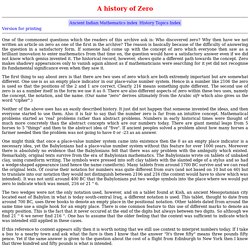
Why then have we not written an article on zero as one of the first in the archive? The reason is basically because of the difficulty of answering the question in a satisfactory form. If someone had come up with the concept of zero which everyone then saw as a brilliant innovation to enter mathematics from that time on, the question would have a satisfactory answer even if we did not know which genius invented it. The historical record, however, shows quite a different path towards the concept. The Great War. World War One changed everything. 100 years ago the First World War broke out.

That gives us a reason to look back into the past and to remember what happened in these terrible times.SUBSCRIBE now to our channel THE GREAT WAR to go back into the past with our host INDY. What were the positive and negative effects of the Mongol conquest? - Homework Help. ZaGz45K.png (PNG Image, 971 × 997 pixels) Facts On File History Database Center. Phanariots in the Ottoman Empire.
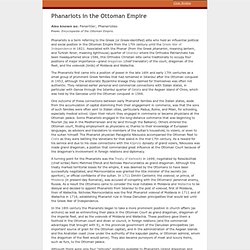
Best of History Web Sites. MacTutor History of Mathematics. U.S. History Timeline. A clever way to estimate enormous numbers - Michael Mitchell. The city of walls: Constantinople - Lars Brownworth. A glimpse of teenage life in ancient Rome - Ray Laurence. All Empires: Online History Community. World History for the Relaxed Historian. Napoleon PBS Documentary 1 Of 4.
The Napoleon Series. Napoleon PBS Documentary 2 Of 4. Napoleon PBS Documentary 3 Of 4. Napoleon PBS Documentary 4 Of 4. Ancient Skepticism. 1.
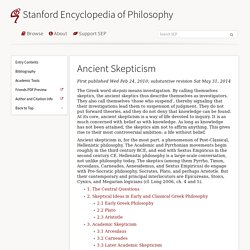
The Central Questions The core concepts of ancient skepticism are belief, suspension of judgment, criterion of truth, appearances, and investigation. Important notions of modern skepticism such as knowledge, certainty, justified belief, and doubt play no or almost no role. This is not to say that the ancients would not engage with questions that figure in today's philosophical discussions. Ancient debates address questions that today we associate with epistemology and philosophy of language, as well as with theory of action, rather than specifically with the contemporary topic of skepticism.
Pre-Socratic philosophers formulate—often in the context of revisionist metaphysical theories, which lead into epistemological discussions—such claims as “nothing is known” (Lee 2010). Like later epistemologists, the ancient skeptics start from questions about knowledge. First People of America and Canada - Native American Indians. Turtle Island. Legends, Treaties, Clipart. Renaissance. Historic Cities: Maps & Documents. History Sites by Knox.
Europe in the Age of the Reformation. This site is intended for multiple audiences: my students, other teachers, and the general public.
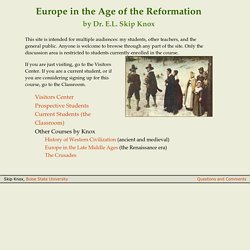
Anyone is welcome to browse through any part of the site. Only the discussion area is restricted to students currently enrolled in the course. If you are just visiting, go to the Visitors Center. If you are a current student, or if you are considering signing up for this course, go to the Classroom. Renaissance. Europe1560_shepherd.jpg (2398×1929) World's 10 Most Mysterious Civilizations. Ibiblio - The Public's Library and Digital Archive.
War Comes to America (complete film) Historical Atlas by William R. Shepherd. How does technology affect the d. The Victorian Web: An Overview. The Arrival of Immigrants. Rise of Hitler: Adolf Hitler is Born. Adolf Hitler is Born At 6:30 p.m. on the evening of April 20, 1889, he was born in the small Austrian village of Braunau Am Inn just across the border from German Bavaria.
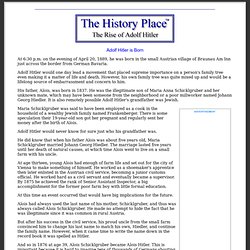
Adolf Hitler would one day lead a movement that placed supreme importance on a person's family tree even making it a matter of life and death. However, his own family tree was quite mixed up and would be a lifelong source of embarrassment and concern to him. His father, Alois, was born in 1837. He was the illegitimate son of Maria Anna Schicklgruber and her unknown mate, which may have been someone from the neighborhood or a poor millworker named Johann Georg Hiedler.
It is also remotely possible Adolf Hitler's grandfather was Jewish. Terms of use: Private home/school non-commercial, non-Internet re-usage only is allowed of any text, graphics, photos, audio clips, other electronic files or materials from The History Place. Principles of War, by Carl von Clausewitz. By Carl von Clausewitz Translated and edited by Hans W.
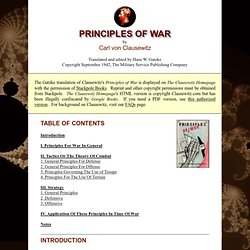
Gatzke Copyright September 1942, The Military Service Publishing Company Introduction I. II. 1. 2. 3. Glencoe.mcgraw-hill.com/sites/2222555555/student_view0/ European History Research Guide. European History Sources. @import url(/css/print.css); Skip to content <a title="Log in to the proxy server" href=" Access</a> <Home ask us!
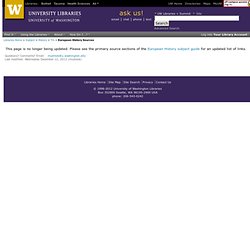
Email | chat | phone | text Advanced Search Log into Your Library Account Libraries Home > Subject > History > Tm > European History Sources This page is no longer being updated. The History Guide. Religion/Culture. Perseus Digital Library. Illyria Forums (Balkans/Mediterraneans/World) - Albanians are not Illyrian. Wilkes is the foremost LIVING authority on the Illyrians.
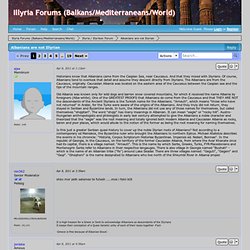
His is the LATEST comprehensive work on the Illyrian people. In his book, "The Illyrians", John Wilkes states on pg: 219: "NOT MUCH RELIANCE SHOULD PERHAPS BE PLACED ON ATTEMPTS TO IDENTIFY AN ILLYRIAN ANTHROPOLOGICAL TYPE AS SHORT AND DARK SKINNED SIMMILAR TO MODERN ALBANIANS. " Wilkes has been proven CORRECT by science when the Human Genome Project's Y-chromosome study of European populations, confirmed that the vast majority of contemporary Albanians do not share an Illyrian or any Indo-European linneage - they are mostly a pre-IE Mediterranean population Albanian is classified as an non-IE(Indo-European) language because no one has been able to classify it into any group, and this is because no one has yet studied all the Caucasian languages. The Albanians. This is a topic not so popular in world history prospect, but it is a disputable topic and I thought that maybe some of you have an opinion about it.
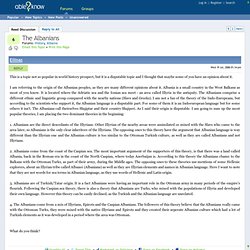
I am referring to the origin of the Albanian peoples, as they are many different opinions about it.